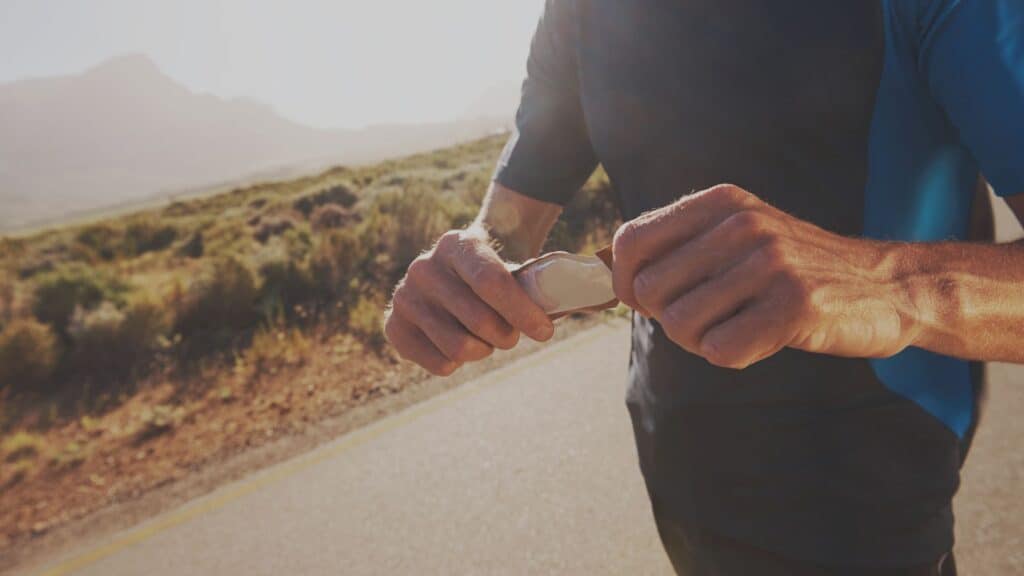The Chicago Marathon is a remarkable 26.2-mile (42.2km) course that takes you through the lively neighbourhoods of Chicago.
As you gear up for this world-renowned race, planning your nutrition strategy carefully is vital. What can you expect to find along the route to fuel yourself to the finish line?
At every aid station along the Chicago Marathon route, you’ll find the Gatorade Endurance Formula to help keep you hydrated and replenish electrolytes. After you pass the halfway point, you’ll get Gatorade Endurance Carb Energy gels, and just before the three-quarter mark of the race, there are Chiquita bananas, which are an excellent way to grab a fast burst of energy to keep you going strong.
In this post, we’ll look at all the nutrition options available along the Chicago marathon route to help you stay energized and reach the finish line with a smile.
Please note that event details, including nutrition options, may change from year to year due to sponsorship and logistics. To stay up-to-date, we recommend checking the official Chicago Marathon website for the latest information.

What Nutritions Options You Will Find On The Chicago Marathon Route
The Chicago Marathon is well-prepared to support you with 20 aid stations spread approximately every one to two miles (1.6-3.2 km) along the course.
These aid stations ensure that you stay energized throughout the race.
Here’s what you can expect at each aid station:
Gatorade Endurance Carb Energy Gel stations are strategically placed at Aid Station 10 (Mile 13.6/21.9km) and Aid Station 14 (Mile 18.2/29.3km). These gels are designed to provide a quick energy boost to help you tackle the later stages of the race.
The Gatorade Endurance Carb Energy gels come in three 3 flavours: caffeinated strawberry, non-caffeinated mango, and non-caffeinated vanilla.
The caffeinated strawberry flavor contains 30 mg (0.00106 oz) of caffeine per serving.
The non-Caffeinated gel flavors like mango and vanilla provide 20 grams (0.71 oz) of carbohydrates, 100 mg (0.004 oz) of sodium, and 80 calories per serving.
Aid Stations 15-18 (Miles 19.5-23.5/31.4 – 37.8 km) will have Chiquita Bananas available. Bananas are a great source of natural energy and potassium.
Moreover, bananas offer a fast burst of energy thanks to their natural sugars, giving you the pick-me-up needed to tackle the remaining miles with gusto.
At these aid stations, you will also find the following amenities:
- A Medical Tent equipped with access to a Runner Transport Vehicle
- Standard and ADA-compliant portable toilets
- A public address announcer
- Water supply
While the Chicago Marathon does offer nutritional options along the route, having your own plan can help ensure you meet your specific needs and enhance your performance.
It is vital that you do nothing new on race day! So do not use products you have never used. Especially products with caffeine as these can affect the gut.
Ensure that you practice and train your gut in your long runs leading up to race day.
How To Fuel For The Chicago Marathon
Achieving a successful fueling experience in the Chicago Marathon largely depends on your preparation, which includes practising your nutrition and hydration strategies during your training.
Here are some essential steps to ensure your fueling plan is thoroughly tested and prepared for the big race day:
The Week Before
In the week leading up to the marathon, prioritize the following:
- Maintain proper hydration levels.
- Ensure you are consuming an adequate amount of carbohydrates.
- “Carboloading” is not necessary. It is advised to ensure you are getting your usual healthy and adequate intake of carbohydrates. That, along with reducing your volume of training in taper week, will help fill your glycogen stores anyway.
- Reduce your fiber intake for 2-3 days before the race to minimize the risk of experiencing runners’ trots.
The Night Before
On the evening prior to the Chicago Marathon, make sure to have the following nutrition checklist in order:
- Plan to have breakfast about two hours before the race.
- Pack a pre-race snack and a water bottle to keep your energy levels up while you wait in your starting corral
- Lay out your race nutrition items, such as gels, bars, sports drinks, and rehydration solutions. Having them ready makes fueling during the race more convenient
- Stay well-hydrated but avoid alcohol consumption, which can dehydrate your body.
Now, let’s discuss breakfast before the Chicago Marathon..
Breakfast Before The Chicago Marathon
Eat your breakfast about two hours before the marathon.
The goal is to preserve your glycogen stores and slow down their depletion during the race. While it may not completely prevent hitting the “wall,” it can delay its onset.
Make sure your breakfast is low in fat and fibre, as these can lead to digestive issues during the race.
Stick to the nutrition that you have practiced consuming during your training to avoid surprises on race day.
Examples of suitable breakfast options before running a marathon include:
- Oats
- Pancakes with fruit
- Granola with milk
- Sweetcorn fritters
- Toast with peanut butter
- Banana bread
- Low-fiber, low-sugar cereal
- Bagels
- English muffins
- Rice cakes
Finally, Just Before The Race Starts (About 20-45 Minutes Before)
As the start time approaches, it’s normal to feel a mix of excitement and anxiety.
Since you might have to wait for a while before your corral starts, it’s essential to have some snacks on hand to maintain your energy levels.
Around 15 minutes before the marathon begins, take a moment to sip water from your bottle and consider consuming a gel or a small portion of an energy bar. Or alternatively, you can sip on an energy drink of sorts if you do not like gels.
This will provide you with a quick boost of fuel to kickstart your race on the right foot.
With your body properly fueled and hydrated, you’ll be in a better position to face the challenges of the marathon, maintain a steady pace, and push through any moments of fatigue.
The confidence that comes from knowing you’ve taken care of your nutrition can be a valuable mental boost as well.

How Many Gels Should You Consume During The Chicago Marathon
During the Chicago Marathon, the number of gels you should consume can vary based on your individual needs and the specific gel products you choose.
Gels can also get sickly sweet and too many can make you feel nauseous
Generally, it’s recommended to aim for an intake of 30 to 60 grams (1.06 to 2.12 oz) of carbohydrates per hour during a marathon.
Different gel products have varying carbohydrate contents. Some may contain more carbs or caffeine than others.
It’s essential to check the carbohydrate content of the gels you plan to use and adjust your intake accordingly.
Variety is key in a race as long as a marathon. Having the same product for 3-6 hours will not only be mundane but can also make you feel ill.
Your gel consumption should be part of your overall carbohydrate intake strategy, which may include other sources of carbohydrates like energy drinks, bars, or even real foods.
Ensure that your total carbohydrate intake falls within the 30 to 60 grams per hour range.
Some runners find it challenging to rely solely on gels for their carbohydrate intake.
Mixing in other sources, such as energy bars or drinks available along the route, can provide variety and help you meet your carbohydrate goals.
In hot weather conditions, it’s crucial to consume water along with your gels to avoid dehydration.
Without sufficient hydration, you may experience nausea or other issues. Be mindful of your fluid intake, especially in warmer environments.
Nausea Before, During, or After Your Run? Here Are 5 Reliable Ways To Prevent It
What Nutrient Would A Marathon Runner Need Most On Race Day?
The most important nutrient you need to consume on race day is carbohydrates. Carbs provide your body with glycogen, which is stored in muscles and serves as a crucial energy source for efficient performance.
Hydration, particularly water, is also vital, while other nutrients like electrolytes may become more or less important depending on environmental conditions.
For instance, on a hot day, additional electrolytes might be needed, but it’s a common mistake to rely solely on electrolytes without adequate carbohydrate intake.
Lastly, the key takeaway is the importance of practising your race-day nutrition strategy during your training to ensure it works well for you.
Experimenting with different gels, foods, and hydration plans during your long training runs will help you fine-tune your nutrition strategy for the Chicago Marathon and increase your chances of success on race day.



Comments are closed.